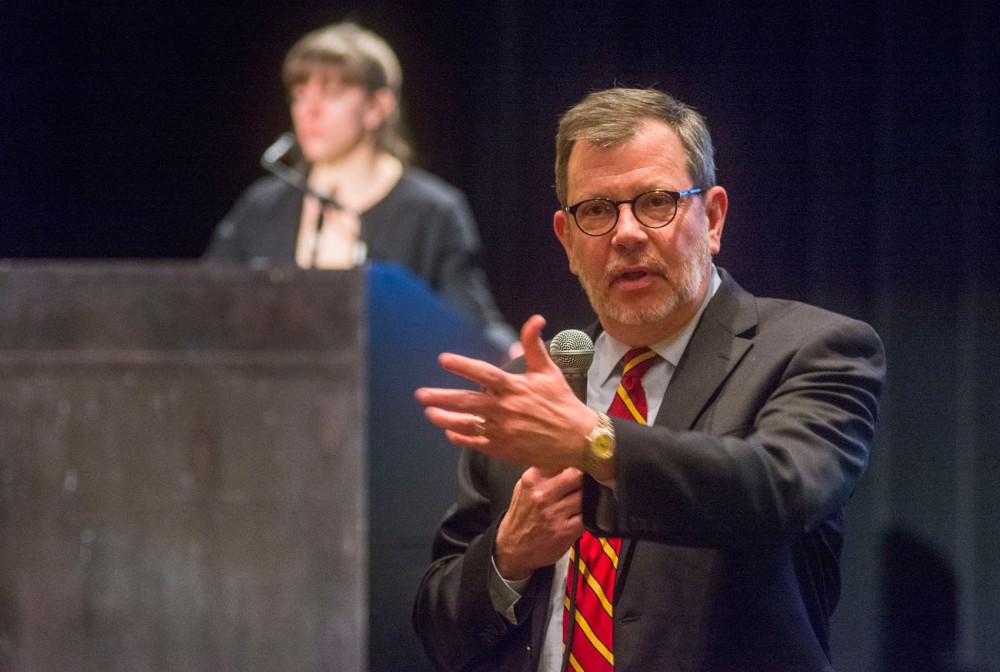After years of scrutiny and numerous calls to investigate University of Minnesota research practices involving human subjects, faculty and community members sounded off on a report that was highly critical of some research methods.
University Faculty Senate members met Friday to discuss a human-subject-research-program report released on Feb. 27 that found serious flaws in some of the school’s practices.
Most faculty members were pleased with the report’s depth and thoroughness, but some were concerned that the University isn’t taking enough responsibility for past controversies with the program.
The senate passed a resolution in December 2013 requesting an external review of clinical research practices involving human subjects. The measure followed years of scrutiny after Dan Markingson committed suicide in 2004 while participating in an antipsychotic drug study at the University.
The University signed a contract with the Association for the Accreditation of Human Research Protection Programs Inc. last summer to oversee the review team, which examined protection practices for human subjects at the University from 2011 to 2014.
The team found ongoing problems within some of the school’s practices involving human research subjects, including weak expert review of research, inconsistent processes regarding consent and a lack of ethics training.
It also listed a number of recommendations to help improve the practices, which University leaders pledged to implement.
Two members of the external research review team attended the meeting via webcam to answer faculty members’ questions.
At Friday’s meeting, team member David Strauss said the school should beef up its Institutional Review Board — which evaluates research projects that involve human subjects to ensure participant protection — with a larger and more diverse faculty membership.
Jerry Cohen, horticultural science professor and faculty senator, said he was disappointed with the report’s findings and to learn that some researchers prioritize their work over human subjects’ wellbeing. Still, he said he hopes the recommendations will allow the school to eventually improve.
More critical faculty members at the meeting expressed continued concerns with the University’s practices and lack of accountability.
Associate bioethics professor Leigh Turner, who has been vocal about his disapproval of the University’s human subject research program, remained highly critical of the school at Friday’s meeting.
“We’re acting as though this report is news, but in fact there’s been several years where concerns have been brought forward in very detailed, concrete ways,” he said at the meeting.
Turner said University leadership hasn’t adequately responded to problems he says have been happening within the program for years, and he questioned University President Eric Kaler’s commitment to repair the program’s current state.
Though Kaler recognized that there are serious issues with some of the University’s research practices involving human subjects, he said he hopes to work toward making the school’s research program a national model.
“It is worrisome that we have such a distance to go to reach the highest standards,” Kaler said to the meeting attendees. “Clearly, we have a long way to go to become beyond reproach.”
Will Durfee, former faculty consultative committee chair, commended the report for its unbiased and crucial findings. Durfee, who was chair of the committee when the initial review was planned, acknowledged that some recommendations may take a while to be fully implemented.
“What’ll be more important is to look at where we are, say, a year from now,” he said.
Mike Howard, a friend of the Markingson’s family, spoke on their behalf during the meeting.
He thanked the Faculty Senate for persistently pursuing the investigation into issues involving human subjects.
“Hopefully, this report can serve as a conduit between the numerous offices within the University charged with protecting human subjects in research, and be used as a tool for holding those offices … accountable,” he said.


